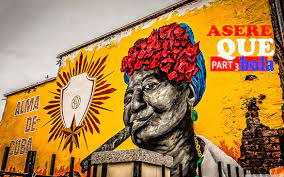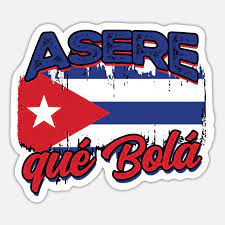
DICHOS Y FRASES POPULARES CUBANAS Y LA “JERGA” QUE INVENTAMOS. PHOTOS.
Si hay algo que distingue las frases cubanas es el humor, porque en Cuba “el que no tiene de congo, tiene de humorista”. Gran parte de las expresiones cubanas se originan en cotidianidades de la isla, en mitos, leyendas urbanas o en bromas locales. Y es que los dichos cubanos no son más que el reflejo de nuestra idiosincrasia y de la identidad del pueblo.
El vocabulario popular de Cuba es riquísimo, muy ingenioso y coloquial, tan expresivo y sabroso como el cubano mismo, porque sí, los cubanos tenemos un doctorado en eso de reinventar significados y palabras.
Si entiendes todas y cada una de estas frases típicas, de verdad eres cubano, o te puedes hacer pasar por uno ;). ¡Qué tiemble el diccionario que la dosis de cubanismos está “a pululu” en este artículo!
LA JERGA QUE INVENTAMOS
Dudo que encuentres muchas expresiones más cubanas que ésta:
¿Aseré qué bolá?
Entonces, ¿qué significa exactamente?
Aseré qué bolá es la forma de decir “¿qué onda amigo?” en español cubano, y se usa como un saludo muy informal que se usa entre amigos.
Qué bolá significa “¿qué pasa?” y aseré significa hermano, amigo o amigo. En cuanto a cuándo y con quién usarlo, aplique el mismo criterio que usaría con sus equivalentes en inglés, “hey bro”, “what’s up” o “what’s up bro” y todo estará bien.
También lo verás como: ¿Qué bolá aseré?
Bolá a veces se escribe como volá. La razón es que el sonido de b y v a veces es idéntico, por lo que los hablantes no siempre tienen del todo clara la ortografía.
Y puedes usar “Qué bolá” y “aseré” de forma independiente.
LA NUEVA JERGA
Hoy escuchamos a jóvenes y adultos de cualquier estrato social decir ambia, cúmbila, consorte, monina, nague o negue y asere, esta última las más pronunciada y difundida entre todas, y es que el poeta nacional Nicolás Guillén incorporó a nuestra literatura la lengua de los negros bozales como algo natural.
El término asere es de auténtica estirpe carabalí y no Yoruba o Lucumí como se ha dado a creer y fue registrado en 1961 en su presente significación como amigo fiel, en la compilación “Habla popular cubana de hoy“ de la revista Actas del Folklore y en la colección de Cubichismos del escritor y periodista Argelio Santiesteban.
El vocablo no es tan nuevo entre los cubanos como algunos piensan, ya que en la década del 30 el contrabajista y director de orquesta Estanislao Servía, compuso el danzón “Asere Cipriano“ y en la novela “Las Iniciales de de la Tierra“, de Jesús Díaz, aparece el término, como muestra de su inclusión en el lenguaje escrito.

NO SE CREA NI INVENTA
Gonzalo Martín Vivaldi, catedrático y periodista granadino fallecido en 1983 planteó en una ocasión y con razón. “El diccionario va detrás de la lengua: es un espejo donde se refleja el decir de la gente. No crea ni inventa, recolecta“, como se manifiesta en el tan recurrido asere, propio de los oriundos de la mayor de las Antillas.
Los primeros habitantes de Cuba y los esclavos africanos nos dejaron palabras que persisten en nuestra forma de expresarnos. Pero al rico vocabulario isleño se suman otras que forman parte de la jerga que inventamos a diario, como es el caso de Qué volá?, que quiere decir cómo estás? o qué pasa?, según la intención del parlante.
Ahora bien, los cubanos desperdigados por el planeta, en mayoría en el sur de la Florida, también hablamos así, como fieles exponentes del legado de nuestros ancestros, con la problemática que los emigrantes de otras naciones apenas nos entienden, cuando hablando el mismo idioma decimos: Que volá asere? y la pura? y el curralo?.


CUBAN POPULAR SAYINGS AND PHRASES AND THE “JARGON” WE INVENTED. PHOTOS.
If there is something that distinguishes Cuban phrases, it is humor, because in Cuba “he who is not a Congolese, is a comedian.” Many of the Cuban expressions originate in everyday life on the island, in myths, urban legends or local jokes. And the fact is that Cuban sayings are nothing more than a reflection of our idiosyncrasy and the identity of the people.
The popular vocabulary of Cuba is very rich, very clever and colloquial, as expressive and tasty as the Cuban itself, because yes, we Cubans have a doctorate in reinventing meanings and words.
If you understand each and every one of these typical phrases, you really are Cuban, or you can pass yourself off as one ;). Let the dictionary tremble because the dose of Cubanisms is “on the move” in this article!
THE JARGON WE MADE UP
I doubt you’ll find many expressions more Cuban than this one:
¿Aseré qué bolá?
So what does it mean exactly?
Aseré qué bolá is the Cuban Spanish way of saying “what’s up, friend?” and is used as a very informal greeting used between friends.
Qué bolá means “what’s up?” and aseré means brother, friend, or buddy. As for when and with whom to use it, apply the same criteria you would use with its English equivalents, “hey bro,” “what’s up,” or “what’s up bro,” and you’ll be fine.
You’ll also see it as: ¿Qué bolá aseré?
Bolá is sometimes written as volá. The reason is that the sound of b and v are sometimes identical, so speakers aren’t always entirely clear on the spelling.
And you can use “Qué bolá” and “aseré” independently.

THE NEW JARGON
Today we hear young people and adults of any social stratum say ambia, cumbila, consorte, monina, nague or nege and asere, the latter being the most pronounced and widespread of all, and it is because the national poet Nicolás Guillén incorporated the language of the black bozales into our literature as something natural.
The term asere is of authentic Carabalí lineage and not Yoruba or Lucumí as has been believed and was registered in 1961 in its present meaning as faithful friend, in the compilation “Habla popular cubana de hoy” of the magazine Actas del Folklore and in the collection of Cubichismos of the writer and journalist Argelio Santiesteban.
The word is not as new among Cubans as some think, since in the 1930s the bassist and orchestra director Estanislao Servía composed the danzón “Asere Cipriano” and in the novel “Las Iniciales de la Tierra” by Jesús Díaz, the term appears, as an example of its inclusion in the written language.
IT IS NOT CREATED OR INVENTED
Gonzalo Martín Vivaldi, a professor and journalist from Granada who died in 1983, once stated it and rightly so. “The dictionary follows the language: it is a mirror that reflects what people say. It does not create or invent, it collects,” as is expressed in the often used asere, typical of the natives of the largest of the Antilles.
The first inhabitants of Cuba and the African slaves left us words that persist in our way of expressing ourselves. But the rich island vocabulary is joined by others that are part of the slang that we invent daily, such as Qué volá?, which means how are you? or what’s up?, depending on the speaker’s intention.
Now, Cubans scattered around the planet, mostly in South Florida, also speak like this, as faithful exponents of the legacy of our ancestors, with the problem that emigrants from other nations barely understand us, when speaking the same language we say: Que volá asere? and la pura? and el curralo?.

Agencies/ Wiki/ DimeCuba/ Arrajatabla/ Alberto Denis/ LaJergaInventadaCuba/ Extractos/ Excerpts/ Internet Photos/ Arnoldo Varona.
www.TheCubanHistory.com
THE CUBAN HISTORY, HOLLYWOOD.



